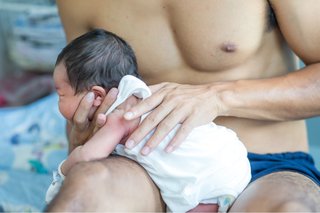How to burp your baby
It's important to burp or wind your baby during or after feeds. When your baby swallows, air bubbles can become trapped in their tummy and cause a lot of discomfort.
Some babies find it easy to burp, while others need a helping hand.
When should I burp my baby?
There are no rules on when you should burp your baby – some babies need burping whilst they're taking their bottle, some after.
Look for clues: if your baby seems uncomfortable while bottle feeding, have a little break to wind them. If they seem fine while feeding, wait until they've finished.
Your baby will let you know!
Best burping positions
The key to burping is to support your baby's head and neck, make sure their tummy and back are nice and straight (not curled up), and rub or pat their back gently. You do not need to spend ages winding your baby – a couple of minutes should be enough.
There are a few ways to wind your baby. Try them all out and see which works best – or use a combination.

1. Over your shoulder
Put the bottle down and then, with your baby's chin resting on your shoulder, support the head and shoulder area with one hand, and gently rub and pat your baby's back.
Walking around at the same time can help.

2. Sitting on your lap
Sit your baby on your lap facing away from you. Place the palm of your hand flat against their chest and support their chin and jaw (do not put any pressure on the throat area).
Lean your baby forwards slightly and with your free hand, gently rub or pat your baby's back.

3. Lying across your lap
Lie your baby across your lap face down. Support their chin (do not put any pressure on the throat area) and use your free hand to gently rub or pat your baby's back.
What if my baby cannot burp?
If these winding methods do not work and your baby shows signs of trapped wind (crying, arched back, drawing legs into tummy, clenched fists), try lying them on their back and gently massaging their tummy. Also move your baby's legs back and forth – like they're riding a bicycle.
If this does not work, talk to your health visitor. They'll be able to advise you on the best thing to do.